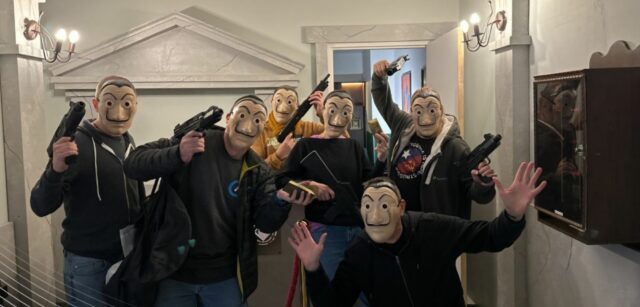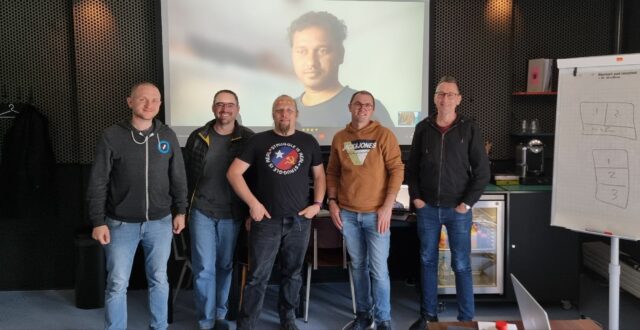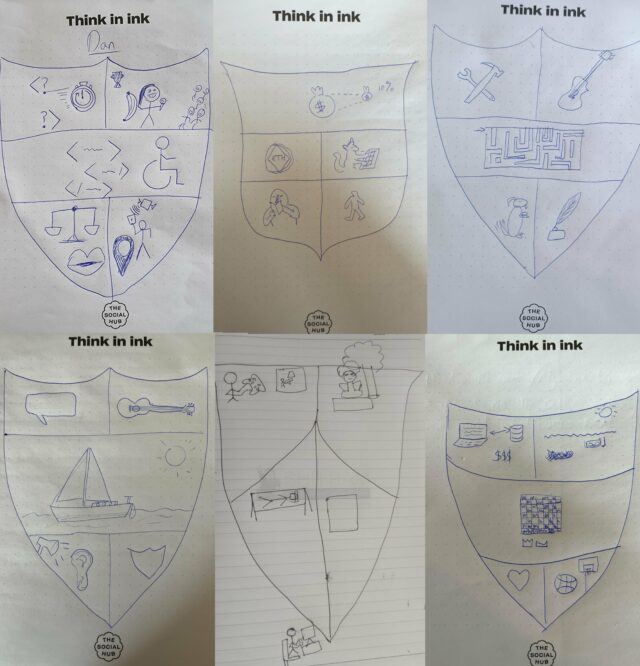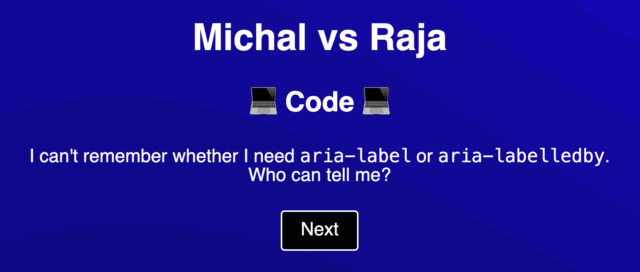I’m in Amsterdam for a meetup for my new team at Automattic.

When we’ve not been out tackling escape rooms, finding geocaches, and eating curry, we’ve been doing a variety of activities to help solidify our new team’s goals, priorities, and expertise: y’know, the normal things you might expect on a company away week.
I volunteered to lead the initial session on our first day with a couple of icebreaker games, which went well enough that I’m inclined to share them here in case they’re of any use to you. The games we played are called Heraldry and Compairs. Let’s take a look:

Heraldry
I was looking at the coat of arms of Noord Holland, the province in which Amsterdam lies, and thinking about all the symbolism and propaganda that’s encoded into traditional heraldry, and how much effort it takes to decode it… unless you just, y’know, guess!
I asked each participant to divide a shield into five quadrants and draw their own coats of arms, featuring aspects of (a) their work life, (b) their personal life, (c) something they value, (d) something they’re good at, and (e) something surprising or unusual. I really wanted to keep the time pressure on and not allow anybody to overthink things, so I set a 5-minute timer from the moment everybody had finished drawing their shield outline.
Then, everybody passed their drawing to the right, and each person in turn tried, as best they could, to introduce the person to their left by attempting to interpret their neighbour’s drawing. The known categories helped to make it easier by helping people latch onto something to start talking about, but also more-challenging as people second-guessed themselves (“no, wait, maybe it’s sailing you’re good at and guitar you play in your personal life?”).

After each introduction is made, the person being introduced gets to explain their heraldry for themselves, congratulating their introducer on the things they got right and their close-guesses along the way.
It’s sort-of halfway between “introduce your neighbour” and “pictionary”. And it worked well to get us warmed-up, feeling a little silly, knowing one another slightly better, and in a space in which everybody had been expected to have spoken and to have made a harmless mistake (everybody managed to partially-interpret a shield correctly). A useful place to be at the end of an icebreaker exercise is left with the reminder that we are, after all, only human.
Compairs
Next up, we played a game only slightly inspired by witnessing a game of Mr and Mrs the other week3. I threw together a Perchance (which, in the nature of such things, is entirely open-source and you’re welcome to adapt it for your own use) that generated a series of randomly-selected pairs of teammates and asked a question to differentiate the two of them.

Participants other than the two shown on the screen were challenged to guess the answer to the question. Sometimes the questions would have a definitive answer, and sometimes not: the joy was in the speculation! “Hmm, I know that Dan’s done quite a bit of globetrotting… but could he actually have travelled further East than a colleague who lives much further East than him?”
After a few seconds to a minute, once their colleagues had settled on an answer, the people listed on the question were encouraged to make their own guesses. Usually they’ll have a better idea as they are one of the data points, but that’s not always true!

There’s no points, and you can play for as long as you like so long as it’s long enough that everybody gets at least one turn, so it’s a good “fill the rest of the time slot” game. It follows Heraldry moderately well as an icebreaker double-feature because the former is firstly about learning things about one another (and to a lesser extent guessing), and the latter is about the opposite.
I came out of both games knowing more about the humans behind the screens in my new team, and it seemed to open up the room for some good discussions afterwards, so the social lubricant effect was clearly effective too. If you give them a go or adapt them into anything else, let me know!
Footnotes
1 Our absent colleague instead had to tower over us on an enormous projector screen.
2 The red (“gules”) upright (“rampant”) lion in the coat of arms possibly comes from the heraldry of the city of Gelderen in Germany, but once part of the Dutch Republic. The lions striding (“passant”) to the left (“to dexter”) but turning to face you (“guardant”) come from the arms of Fryslân (Friesland), and its rectangles represent the districts of Fryslân. Aren’t you glad you asked.
3 Also known as The Newlyweds Game after the US game show of that name and basically the same format, Mr and Mrs is a game in which a (typically newly) married couple are asked questions about one another and their lives together which they answer separately and then those answers are compared. This induces a reaction of compersion when they’re “right” and in-sync and when the couple disagree it results in amusement. Or possibly divorce.
I love the heraldry game! It sounds great!
In your footnote you have the lion to the left (to dexter) but my old Latin tells me that’s right and sinister is left.
The Wikipedia entry has the attitude as assumed as being directional forward, or directional from-left-to-right and directions then refer to either position or facing. The eyes are to the right (so register to vote, kids): is that enough for the attitude?
(In the film Stand By Me Gordy tells a story about town bullying and at the end Vern only has one question about one minor, unimportant detail in the story and once he gets his answer he smiles contendedly and says “good story!” and I feel a bit like that. X)
In heraldry, animals are assumed to be facing you, and so their right – dexter – is your left! In fact you’ll notice that the blazon doesn’t actually mention the direction of the lion because to dexter is the default.
Have a look at some coats of arms and you’ll notice that, outside of any “supporters” (animals to the sides, holding the shield), they’re very rarely depicted sinister (which is to their left, our right) at all!
tl;dr: heraldry attitudes are one of those things like stage directions where they only make sense if you’re looking from a particular perspective.
…in England and Wales From 1696 until 1851 a “window tax” was imposed in England and Wales. Sort-of a precursor to property taxes like council tax today, it used an estimate of the value of a property as an indicator of the wealth of its occupants: counting the number of windows provided the mech
Read more →